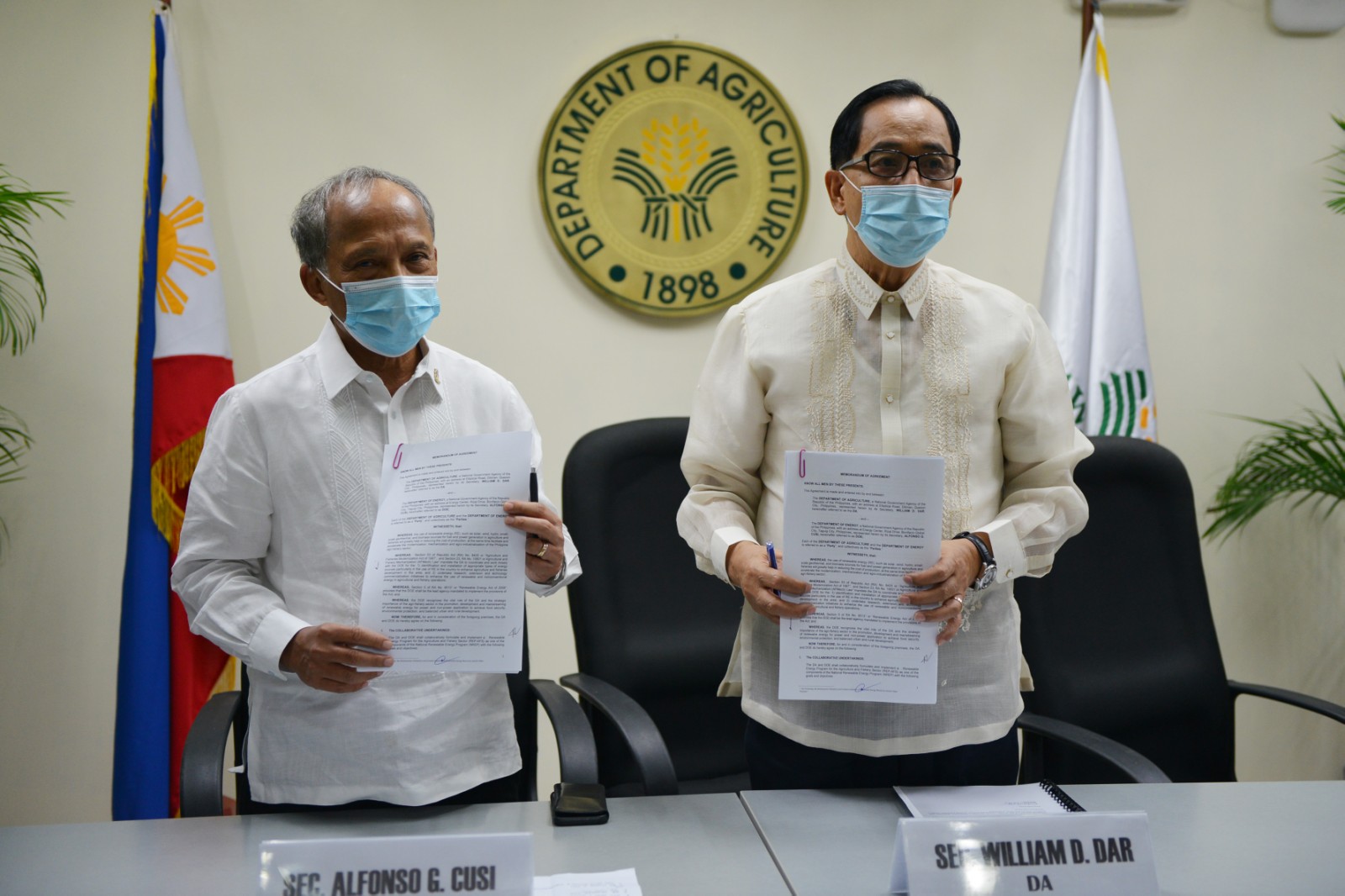
REvving UP THE FOOD AND ENERGY SYNERGY: Energy Secretary Alfonso G. Cusi (left) signs a Memorandum of Agreement with Agriculture Secretary William P. Dar (right) to develop and implement a Renewable Energy Program for the Agriculture and Fishery Sector (REP-AFS).
The REP-AFS seeks to optimize the utilization of renewable energy resources and technology in the country's agri-fishery sector to help boost food and energy security, especially in this time of pandemic.
TAGUIG CITY - As part of collaborative efforts to boost the country’s energy and food security, especially during the novel coronavirus (COVID-19) pandemic, Department of Energy (DOE) Secretary Alfonso G. Cusi yesterday (6 August) signed a Memorandum of Agreement (MOA) with Agriculture Secretary William P. Dar at the Department of Agriculture (DA) in Diliman, Quezon City.
"We have been actively seeking ways for the DOE and DA to work closely together, given that food and energy security are intertwined concepts. With the COVID-19 crisis further underscoring the importance of energy and food independence, we want to build on this momentum to ensure that we are able to fully utilize our indigenous energy resources to boost our agrifood sector," Energy Secretary Cusi said.
Under the MOA, the DOE and DA will develop and implement a comprehensive Renewable Energy Programs and Projects for the Agriculture and Fishery Sector (REP-AFS), as part of the National Renewable Energy Program and Food Security Program. The objectives of the REP-AFS are:
• strengthen and/or expand the implementation of existing renewable energy (RE) programs, projects, and technologies for the agri-fishery sector in all feasible sites all over the country, such as, but not limited to solar-powered irrigation systems (SPIS); biomass gasifiers; and small-scale geothermal energy to supply heat, mechanical and electrical power for farm machinery, post-harvest facilities, and greenhouses;
• promote the use of RE, such as solar, wind, hydro, biomass, small-scale geothermal, and other farm-based energy resources for agriculture and fisheries to reduce the cost of production of agri-fishery products;
• develop new and emerging RE technologies for the agri-fishery sector in collaboration with research and development institutions, state colleges and universities, and the private sector;
• promote and coordinate the human resource/manpower development of RE for the agri-fisheries sector through capacity development; and the deployment of agricultural and bio systems engineers, technicians, farmers, fishermen, farm workers, and other concerned stakeholders in collaboration with the Technical Education and Skills Development Authority, Commission on Higher Education, Department of Labor and Employment, and the Department of Education;
• promote, coordinate and/or undertake the development and implementation of standards on the design and construction of RE equipment and facilities for the agri-fishery sector; and
• provide technical and other support services to local manufacturers, fabricators, and suppliers of locally-produced equipment and components of RE-powered agri-fishery systems; and encourage continuing technology innovation through public private partnerships, joint venture arrangements, technology business incubation, contract research, management contract, and other legal instruments.
A Joint Technical Working Group (TWG) will be created to develop the detailed programs and projects, address policy and technical requirements, and attend to other related concerns. The TWG will be composed of the DOE-Renewable Energy Management Bureau; and the DA's Bureau of Agricultural and Fisheries Engineering, Philippine Rice Research Institute, Philippine Center for Postharvest Development and Mechanization, Sugar Regulatory Administration, Philippine Coconut Authority, and Bureau of Fisheries and Aquatic Resources.
“This is a win-win partnership for our energy and food industries. Energy is needed throughout the agrifood production process, and at the same time, the systems being used are also able to produce energy. It is up to us to optimize this synergy to benefit our people,” Secretary Cusi concluded.
###
